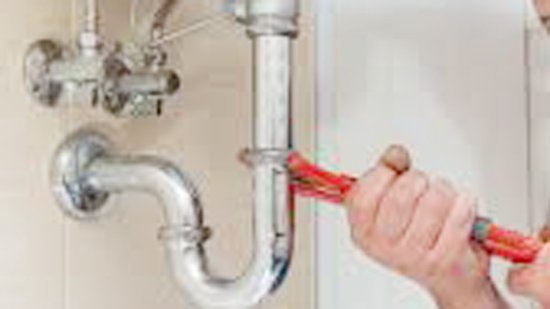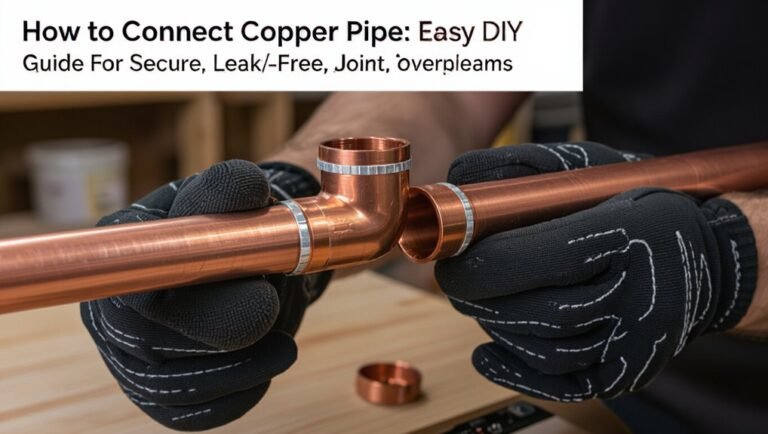Can a Homeowner Do Their Own Plumbing?
As a homeowner, it’s not uncommon to face various maintenance tasks around the house. From fixing leaky faucets to unclogging drains, there are endless plumbing issues that can arise. This leads many homeowners to wonder if they can tackle these problems on their own. We will explore the pros and cons of homeowners taking on their own plumbing.

Photo by bobvila
Pros of homeowners doing their own plumbing
Cost savings
One of the most significant advantages of handling your own plumbing is the potential cost savings. When considering bathroom plumbing cost, doing the work yourself can help you avoid expensive labor fees. However, it’s essential to weigh the complexity of the task against the savings to ensure a successful outcome. Hiring a professional plumber can be expensive, especially for minor repairs or maintenance tasks. By handling these tasks on your own, you can avoid hefty service fees and potentially save a significant amount of money in the long run.
Convenience and flexibility
When you have the necessary skills and knowledge to handle your own plumbing, you gain a sense of convenience and flexibility. You no longer have to wait for a plumber’s availability or schedule appointments. Instead, you can address the issue right away, at your own convenience. This level of flexibility can be particularly beneficial in emergency situations when immediate action is required.
Personal satisfaction and learning experience
Successfully completing a plumbing project on your own can be incredibly rewarding. It gives you a sense of personal satisfaction and boosts your confidence in your own abilities.
Taking on your own plumbing allows you to learn new skills and gain a better understanding of how your home’s plumbing system works. This knowledge can come in handy for future maintenance and troubleshooting.
Here’s another post you might find useful: Is Plumbing Hard to Learn?
Cons of homeowners doing their own plumbing
Lack of expertise and knowledge
While there are certain plumbing tasks that homeowners can handle, there are limits to what they can do without professional expertise. Without a comprehensive understanding of plumbing systems, there is a risk of making mistakes or causing further damage. In more complex situations, it is crucial to recognize when it is best to leave the job to a professional who has the necessary knowledge and experience.
Time-consuming and labor-intensive
Plumbing projects can be time-consuming, especially for those who are not familiar with the intricacies of the trade. What may seem like a simple repair can turn into a lengthy and challenging task. Plumbing work often requires physical labor, which can be strenuous for individuals who are not accustomed to it. Before taking on a project, it’s important to consider whether you have the time and energy to devote to DIY plumbing solutions. Tackling plumbing issues yourself can be cost-effective, but it requires careful planning and the right skills to ensure a successful outcome.
Limited access to specialized tools and equipment
Professional plumbers have access to a wide range of specialized tools and equipment that may not be readily available to homeowners. These tools are designed to make plumbing tasks more efficient and effective.
Without access to such equipment, homeowners may find it more difficult to tackle certain plumbing problems or may need to resort to makeshift solutions that may not be as effective or long-lasting.
Safety considerations when doing your own plumbing
When it comes to plumbing, safety should always be a top priority. Here are some safety considerations to keep in mind when taking on your own plumbing:
Shut off the water supply
Before starting any plumbing work, it is vital to shut off the water supply to the area you will be working on. This will prevent any accidental flooding or leaks while you are making repairs or modifications.
Use proper protective gear
Plumbing work often involves handling chemicals, sharp tools, and potentially hazardous materials. Ensure you wear appropriate protective gear, such as gloves, safety glasses, and closed-toe shoes to minimize the risk of injury.
Follow manufacturer instructions
When using plumbing products or materials, always follow the manufacturer’s instructions. Improper use can lead to accidents or damage to your plumbing system.
Know your limits
Not all plumbing tasks are suitable for DIY projects. Recognize your limits and don’t hesitate to call a professional if you feel unsure or overwhelmed. It’s better to be safe than to risk causing further damage or injury.
Tools and equipment needed for DIY plumbing
To successfully tackle your own plumbing projects, you will need a set of essential tools and equipment. Here are some commonly used items:
Adjustable wrench
An adjustable wrench is a versatile tool that allows you to tighten or loosen various plumbing connections, such as pipes and fittings.
Pipe wrench
A pipe wrench is specifically designed to grip and turn pipes. It provides a strong grip and leverage for tightening or loosening stubborn connections.
Plunger
A plunger is a must-have tool for unclogging drains and toilets. It creates pressure to dislodge blockages and restore proper flow.
Pipe cutter
If you need to cut through pipes, a pipe cutter will make the task much easier. It ensures clean and precise cuts without damaging the surrounding area.
Auger
An auger, also known as a plumbing snake, is a flexible tool used to remove stubborn clogs from drains and pipes. It can reach deep into the plumbing system to clear blockages.
Tape measure
A tape measure is essential for accurately measuring distances and ensuring proper fittings and connections.
Common plumbing problems homeowners can handle
While some plumbing issues require professional assistance, many common problems can be tackled by homeowners themselves. Here are a few examples:
Leaky faucets
Leaky faucets are a common annoyance in many households. Fortunately, they are often caused by worn-out washers or O-rings, which can be easily replaced with basic tools.
Clogged drains
Minor clogs in sinks, showers, or bathtubs can often be cleared with a plunger or a plumbing snake. These simple tools can help dislodge the blockage and restore proper drainage.
Running toilets
A running toilet can waste a significant amount of water and increase your utility bills. In many cases, the issue can be resolved by replacing a faulty flapper or adjusting the float mechanism inside the toilet tank.
Low water pressure
If you’re experiencing low water pressure throughout your home, the problem may lie in a clogged aerator or a malfunctioning pressure regulator. These components can be cleaned or replaced to restore adequate water flow.
Steps to take when tackling DIY plumbing projects
When taking on a DIY plumbing project, it’s important to approach it systematically and follow a set of steps to ensure success. Here is a general outline to guide you:
Identify the problem: Determine the exact issue you are facing and understand its root cause.
Gather the necessary tools and materials: Make sure you have all the required tools and materials before beginning the project.
Shut off the water supply: As mentioned earlier, always shut off the water supply to the area you will be working on to prevent accidental leaks or flooding.
Assess the situation: Evaluate the extent of the problem and determine the best course of action. If the issue seems beyond your capabilities, it may be time to call a professional.
Follow instructions and guidelines: Whether you’re replacing a part, fixing a leak, or installing new fixtures, carefully read and follow the instructions provided by the manufacturer.
Test the solution: Once you have completed the repairs or modifications, turn on the water supply and test the system to ensure everything is working correctly.
When should homeowners call a professional plumber?
While DIY plumbing can be rewarding and cost-effective, there are instances when it’s best to call a professional plumber. Here are a few situations where professional assistance is recommended:
Complex plumbing systems
If your home has a complex plumbing system, such as multiple floors, intricate pipe layouts, or specialized fixtures, it’s advisable to hire a professional. They have the expertise to navigate these complex systems and ensure proper installations or repairs.
Major plumbing emergencies
In the event of a major plumbing emergency, such as burst pipes, severe leaks, or sewer backups, it’s crucial to contact a professional plumber immediately. These situations require prompt and specialized attention to minimize damage and restore your plumbing system.
Lack of confidence or knowledge
If you lack confidence in your plumbing abilities or are unfamiliar with the specific task at hand, it’s always better to seek professional help. Attempting complex repairs without the necessary knowledge and expertise can lead to further damage or safety hazards.
Tips for successful DIY plumbing
For homeowners considering taking on their own plumbing projects, here are some essential tips for success:
Educate yourself: Take the time to learn about basic plumbing principles, tools, and techniques. This knowledge will equip you with the necessary skills to handle simple repairs and maintenance tasks.
Start small: Begin with minor plumbing projects that are within your comfort zone. As you gain more experience and confidence, you can gradually tackle more complex tasks.
Ask for advice: If you have friends or family members with plumbing experience, don’t hesitate to seek their advice or guidance. They can provide valuable insights and tips to help you succeed.
Keep a budget in mind: While DIY plumbing can save you money, it’s important to have a realistic budget in mind. Factor in the cost of tools, materials, and any unforeseen expenses that may arise.
Practice safety precautions: Always prioritize safety when working on plumbing projects. Use protective gear, shut off the water supply, and know when to call a professional if you feel unsure or overwhelmed.
Conclusion
Homeowners can certainly take on their own plumbing projects, but it’s essential to consider the pros and cons before diving in. DIY plumbing offers cost savings, convenience, and personal satisfaction, but it also comes with risks and limitations. It’s crucial to assess your own skills, knowledge, and comfort level before deciding to tackle plumbing tasks on your own.
Remember to prioritize safety, know your limits, and don’t hesitate to call a professional when necessary. With the right approach and preparation, homeowners can successfully handle many common plumbing problems and enjoy the benefits of a well-maintained plumbing system.


